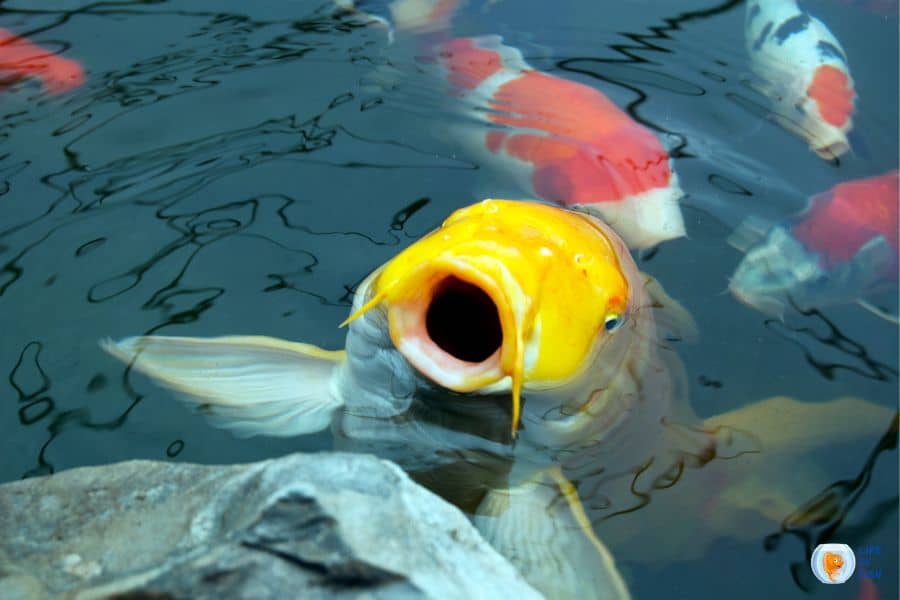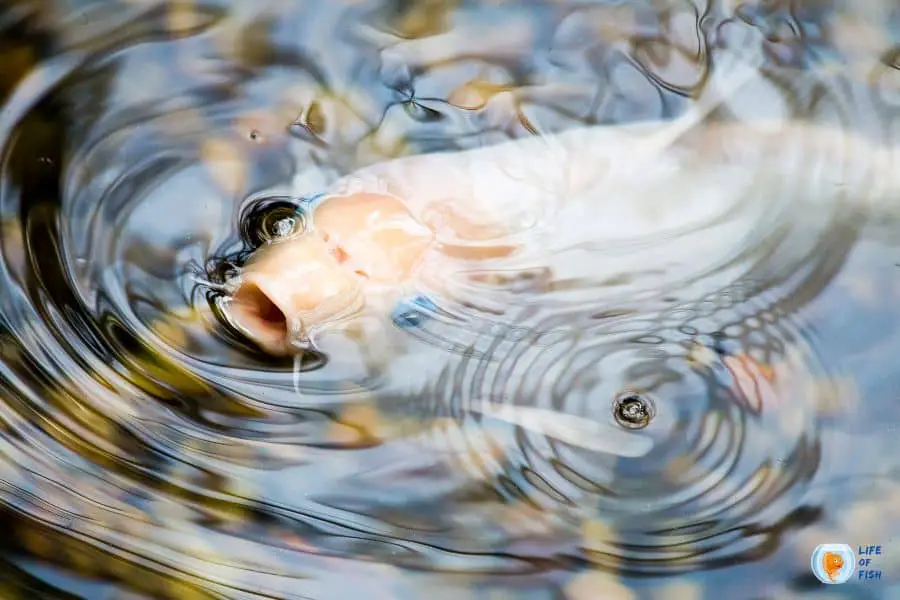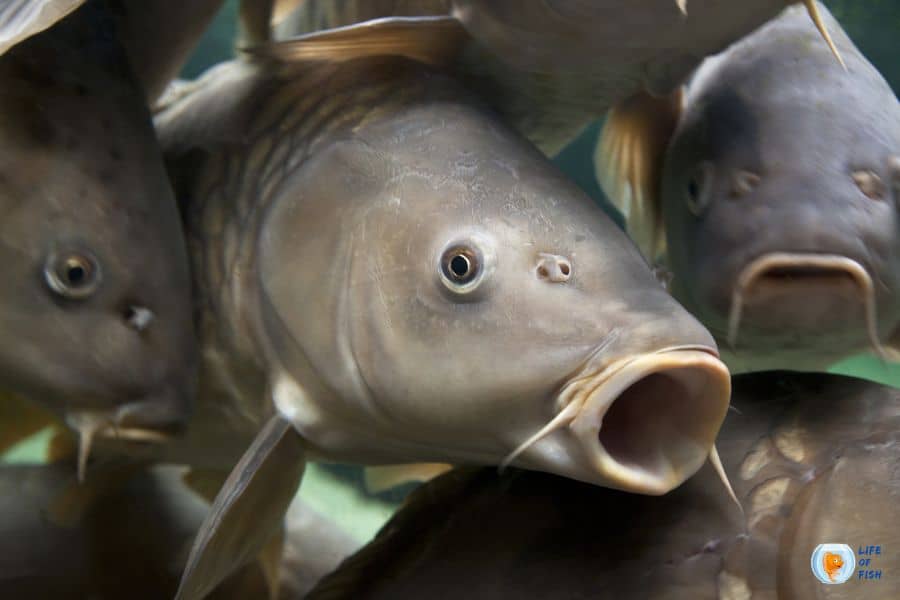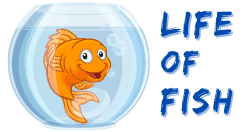Is my fish choking? Just like other animals, fish can choke on food that is too big for their mouths. But fish can also choke on things like gravel, rocks, or even other fish!

For humans and other animals, choking is a serious hazard. We have all heard the story of someone who died after choking on a piece of food. But did you guys know that fish may choke as well?
However, the functionality of their system reacts in a different way than that of mammals. Rather than coughing or vomiting, fish will often spit the object out or try to swallow it whole.
But how do we know that your fish is choking? What is fish choking anyways? Let’s find out.
What Is Fish Choking Anyways?
Jump To
Fish usually can not eat large particles of food because their esophagus is very small. When a fish tries to eat something that is too big, it will first try to spit it out.
If the fish cannot spit it out, then it will try to swallow it whole. But if the object is too big or the fish cannot swallow it whole, the fish will start to choke.
When a fish chokes, it means that the object is blocking the flow of water through the fish’s gills. This impairs the functions of the gills, which are responsible for oxygenating the blood.
If the fish cannot get rid of the object, it will eventually suffocate. This is a serious problem because fish need water to breathe and survive.
If the fish cannot get water to its gills, it will suffocate and die.
Can A Fish Choke To Death?
Yes, a fish can choke to death. As we mentioned before, when a fish chokes, it is not able to get water to its gills.
When fish swallow objects that are too large, the objects can block the fish’s oral cavity, causing the fish to be unable to move its mouth. Fish require some movement in the oral cavity to function their gills.
If the fish cannot move its mouth, then it will not be able to get water to its gills, and it will eventually suffocate and die.
There is some evidence for this instance as well. A Quora user once shared photos of a dead Large Mouth Bass with a half-swallowed fish in its mouth. According to this user, this is common in piscivorous fish like Large Mouth Bass.
In captivity, fish can choke to death by eating large food particles as well as other large objects that flow in the water. This is why it is important to ensure that your fish tank has a filter.
The filter will help to keep the water clean and free of large objects that could choke your fish.
Can Fish Choke On Their Food?
Yes. Fish can choke on their food. However, this is not common in the wild as fish usually eat small prey.
In the wild, fish will often eat small insects or other small animals. These small animals are easy for the fish to swallow and are not likely to choke on them.
However, in captivity, fish are often fed large pellets or flakes of food. These large pellets or flakes can be too big for the fish to eat, and may choke on them.
To avoid this, you should give your fish small pellets or flakes that are easy for them to eat. You can also try crushing the pellets or flakes into smaller pieces to make them easier for the fish to eat.
Can A Fish Choke On Water?
Technically they can not. Unlike humans, fish evolved to live in water. They extract oxygen from the water using their gills.
So, if a fish chokes on the water, it is because an object in the water is impeding the water flow to the gills.
This is why it is so important to keep your fish tank clean and free of objects that could block the flow of water to the fish’s gills.

My Fish Is Choking On A Rock
Fish can choke on rocks as some fish species like to chew on rocks. For example, goldfish, plecos, and cichlids are known to chew on rocks.
Chewing on rocks helps these fish to grind down their teeth as they grow. However, if the rock is too big, then the fish may choke on it.
If you think that your fish is choking on a rock, then you should try to remove the rock from the fish’s mouth.
If you are unable to remove the rock, you should take the fish to a veterinarian who will be able to do so for you.
How To Know If A Fish Is Choking?
To determine if a fish is choking, look for outward signs of distress. The fish will open its mouth wide and flair its gills as if it’s being gagged.
Additionally, the fish may move its pectoral fins back and forth. If the fish is able to expel the object on its own, it will likely recover shortly.
However, if the fish is struggling to remove the object, you should intervene to remove it from the mouth carefully. If the blockage is not removed in time, it could cause long-term damage or even death.
By familiarizing yourself with the signs of a choking fish, you can quickly take action and help ensure a positive outcome for your pet.
What To Do If My Fish Is Choking?
Most of the time, nothing will be needed as the fish will be able to dislodge the object on its own. Your fish will struggle a bit, and within about a minute or two, it will spit the object out. Or else it will swallow it.
However, if the fish is struggling to remove the object within about 5 minutes of time, you should carefully remove it from the fish’s mouth.
You can use a pair of tweezers or your fingers to remove the object. For this, you will have to catch the fish with a net and wait for a bit until your fish relaxes. Then gently remove the struck object from its mouth. Be careful not to damage the fish’s mouth while you are doing this.
If you are not able to remove the object, then you should take the fish to a veterinarian to remove the object for you.
How To Prevent A Fish From Choking?
Seeing a fish choking is not a pleasant experience. Therefore, doing everything we can to prevent choking is the best way to avoid it. For this, we can take several steps.
Keep the aquarium clean and free of objects.
The best way to prevent a fish from choking is to keep the fish tank clean and free of objects that could block the flow of water to the fish’s gills. For this, you can install a powerful filter and do regular water changes.
Feed your fish small pellets or flakes
You should give your fish small pellets or flakes that are easy for them to eat. You can also try crushing the pellets or flakes into smaller pieces to make them easier for the fish to eat.
Be careful when feeding fruits and vegetables.
If you feed your fish vegetables and fruits, make sure they are cut into small pieces that are easy for the fish to eat. Hard vegetables must be boiled and chopped before being fed to the fish.
Avoid overfeeding your fish.
Additionally, you should avoid overfeeding your fish as this can cause them to choke on their food.
Check the fish tank regularly for hazardous objects.
Lastly, you should regularly check your fish tank for objects that could potentially choke your fish.
Following these simple tips and tricks can help prevent your fish from choking.

Related questions
Can goldfish choke on sand?
Sand is a common substrate used in goldfish tanks. It is generally considered safe for goldfish, as they are not likely to eat it, and it does not contain any harmful chemicals.
However, sand can become airborne and be inhaled by goldfish, causing them to choke. In addition, sand can irritate the gills and cause respiratory problems.
If you suspect that your goldfish has choked on the sand, remove it from the tank immediately and rinse its gills with clean water.
If it is struggling to breathe, contact a veterinarian for treatment. With proper care, your goldfish should recover from this incident without any long-term effects.
What happens if a fish eats a rock?
If your fish has successfully swallowed the rock, it will eventually pass through its digestive system and be excreted. However, the rock could potentially block the intestines, causing an obstruction.
If you think your fish has swallowed a rock, watch it closely for signs of distress, such as lethargy, loss of appetite, and difficulty swimming. If you notice any of these signs, contact a veterinarian for treatment.
Can Sharks choke on their food?
While it is rare, sharks can choke on their food if they are not careful. Live Science has once reported a great white shark choked to death after chomping down on a sea turtle. This can happen if the shark swallows a large piece of food whole or if it bites off more than it can chew.
If a shark chokes on its food, it will typically spit the food back out. However, if the food is lodged in the throat or esophagus, it can cause a blockage. This can result in difficulty breathing and, ultimately, death.
Do fish swallow water to breathe?
No. Not all fish swallow water to breathe. There are mainly three types of fish that live in this world.
- cartilaginous fish
- bony fish and
- jawless fish
The gills of most cartilaginous fish are located behind the head and have five or more slits that open directly into the water.
They use something called “ram ventilation” to push water through their gills. This is why these fish must swim to breathe since the forward movement drives water through their gills.
Bony fish have a one-gill opening on each side of their head that is covered by the operculum. This operculum is attached to the mouth and swings open when the fish needs to take in water. Bony fish can swallow water to breathe thanks to this operculum.
Jawless fish don’t have any kind of operculum. Instead, these fish have a thin membrane that covers their gills.
This membrane is attached to the fish’s body and moves along with the fish’s mouth. Jawless fish have to constantly keep moving their mouth in order to get water flowing over their gills.
So, as you see, only some fish species are able to swallow water to breathe.
Conclusion
Fish choking is a rare but potentially fatal condition. If you think your fish has choked on something, removing the object and watching for signs of distress is important.
If your fish is struggling to breathe, either try removing the object with a tweezer or contact a veterinarian for treatment.
With proper care, your fish should recover from this incident without any long-term effects.
Read Next : How To Dispose Of Aquarium Water | The Correct Way |
